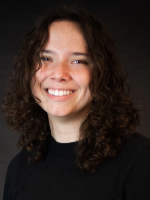Sam Weyrich wasn’t supposed to live past two years. He had Aicardi-Goutiéres syndrome, a rare condition impacting white matter in the brain, leading to severe physical impairments. There is no known cure.
But Sam lived until he was almost 24. His mother, Amy Weyrich, said he “was hardly ever scared of anything.”
Sam’s family called him “The I Can Man” because of everything he did despite his differing abilities. That included horseback riding, art classes, adaptive baseball, river rafting in the Grand Canyon, skiing, running, rock climbing, biking and attending concerts and musicals.
Although he couldn’t speak about what these adaptive experiences meant to him, Amy said his facial expressions and “yelps of joy” said it all.
“We just found out how much he liked it, and so it really was his communication system to us – to continue to do things with him,” Amy said. “And then it turned out that he was a kid that hated to be home.”
The Weyrich family wants others to carry on Sam’s “I Can spirit." That's why they created the Sam the I Can Man Foundation.
The idea for the nonprofit came about four years ago, getting Sam’s stamp of approval before he died last June. The group launched in March.
It funds small equipment, items, activities and experiences to individuals with differing abilities to enhance their lives and enable inclusive experiences for them and their families. A portion of these dollars could also provide small grants and scholarships to nonprofits to support their efforts in serving this community.
Sam, for instance, got to swim independently because he received a device from Australia. Sarah, Sam’s sister and the foundation’s president, said devices like this are expensive and not something insurance will necessarily cover.
“Nothing in the adaptive world is cheap,” Amy, the foundation’s vice president, added. “Mainly, because they're customized a lot of times, and so they don't have mass productions.”

The grant application is open through the end of the month and will reopen for a second cycle in October. The group will also conduct interviews with applicants after the submission window closes.
“From a parent’s perspective, applying for these things can be very laborious and humbling. So I wanted to do it differently,” Amy said. “… [It’s] a pretty simple application that anybody could fill out.”
Some example experiences include adaptive skiing, horseback riding, Grand Canyon river rafting, swimming with dolphins, dance classes, rock climbing and attending a Broadway musical or football game. It could also fund equipment, like a beach wheelchair rental, adaptive bike caddie, adaptive swim device and jogging stroller.
Amy said they’re estimating they’ll provide about 10 to 15 grants in the $1,000 to $2,500 range. However, Sarah said people can still apply if their request goes beyond $2,500 because they could partially fund it.
Sarah said she wants to keep Sam’s story alive and looks forward to seeing how her brother’s “I Can” spirit impacts others.
“A lot of them already have it, but they may not have the means to do it," Sarah said. “If we can help them with the means, or even just help them realize that they can do these things, it's totally possible for them – I think that will be the biggest thing for us. We’re just trying to carry on Sam’s spirit and legacy in others.”
StateImpact Oklahoma is a partnership of Oklahoma’s public radio stations which relies on contributions from readers and listeners to fulfill its mission of public service to Oklahoma and beyond. Donate online.








